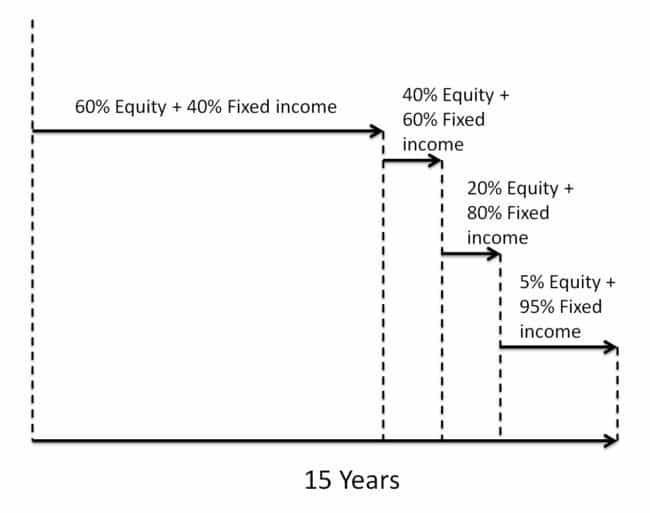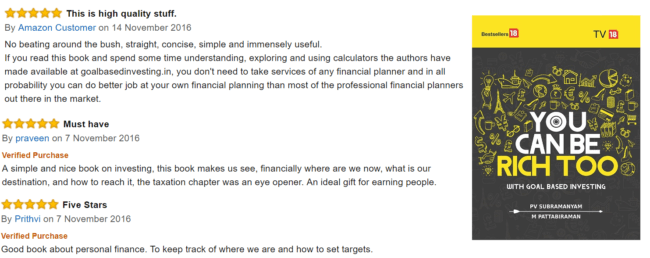Last Updated on December 19, 2021 at 11:42 am
“How can I fund my goal if the market crashes a few years before I need the money?” is a question that I have often encountered. In this post (and the next), I address this issue with some specific examples.
An exit strategy is more important than an entry strategy
Suppose I can invest Rs. 1,000 a month and after a few years, the money has grown to Rs. 1,00,000 (more than possible seen it happen with a Rs. 500 SIP). Should I worry about when to invest 1,000 looking at market levels (aka dip buying) or should I be worried about the risk associated with the 1,00,000?
The point is, no matter when you buy, if the market crashes, the corpus will fall in value. Therefore, I would rather focus my time and energy on the managing the risk associated with the corpus while systematically investing each month. Read more: Managing Risk Without Stopping Mutual Fund SIPs.
Multiple solutions to every problem
Every problem has multiple solutions and it is immature to claim one is better than the other. Just a matter of choosing a strategy that we are comfortable with. Reducing corpus risk (aka de-risking) is no different.
Join over 32,000 readers and get free money management solutions delivered to your inbox! Subscribe to get posts via email! 🔥Enjoy massive discounts on our robo-advisory tool & courses! 🔥
For example, I can continue to invest systematically and
- Change the asset allocation of my portfolio (equity:fixed income ratio) as per market conditions (aka dynamic asset allocation)
- Using index PE
- Using index moving averages
- A combination of both, using other methods etc.
- Change the asset allocation with a set plan (aka strategic asset allocation)
- Reset the asset allocation once a year (aka rebalancing)
- Reset the asset allocation once it deviations by a set amount (5,10%) (aka threshold rebalancing)
- Use a combination of (1) and (2) above.
In addition to the above, I must also have a de-risking strategy in mind.
De-risking strategies
This post is about de-risking strategies. Consider that my asset allocation is 60% equity and 40% fixed income for a financial goal that is 15 years away. To understand how this is chosen in the first place, see deciding on asset allocation for a financial goal.
I cannot afford to maintain this asset allocation for the entire 15 years. As the goal approaches, I must have a strategy in place to reduce equity allocation. This is what the title refers.

Again there are multiple de-risking strategies and I will refer to two that appeal to me.
Returns do not matter
Surprising as it seems, investment returns do not say much about our ability to finance the future. A guy with an LIC policy can end up with more money than an equity guy. Not just because of the risk associated with the latter, but because of the amount invested.
When I perform a financial audit, the only question matters to me is, “what is the corpus worth?”.
If it is retirement, I ask :”If I retire with it today, how long can I be financially independent”.
Or to be more specific, “Is my fixed income asset allocation enough to guarantee me an inflation-protected income for the first 10-15 years in retirement” and the equity allocation enough to grow undisturbed for that amount of time to serve me later.
If it is my son’s education, I ask “What kind of education can I afford today?”.
My son is only about 7 years old and in the 1st standard. By the time he goes to 8th or 9th standard I will have a better idea of how much I will need to pay for his education. So I then starting ensuring that my fixed income assets have an amount close to that. So in the next 3-4 years, before he goes to college, the corpus is reasonably protected from market volatility.
The idea behind this strategy is to shift from equity to fixed income assets such that you ensure things go to plan. I like this because there is nothing technical about this. Just simple common sense.
This idea might seem impossible to you if you have just started out. Trust me, I would have felt the same 3-4 years ago. Give it a little time and you will see what I mean. December is personal financial audit month. So I will give more concrete examples.
Changing Asset Allocation in Stages
The second method is to change asset allocation with time. Or in particular decrease equity allocation gradually. An illustration is shown below. I will post back-testing results with S&P 500 based on this strategy tomorrow.
Other de-risking strategies based on market timing, fear of impending events, Lok Sabha elections etc. can easily be formulated.
Check out reviews for You can be rich too
If you have not purchased it, you can do via Amazon.in. Please consider writing a review either at Amazon.in
Part II
The second part of this study is here: How to systematically reduce the risk associated with a SIP
🔥Enjoy massive discounts on our courses, robo-advisory tool and exclusive investor circle! 🔥& join our community of 5000+ users!
Use our Robo-advisory Tool for a start-to-finish financial plan! ⇐ More than 1,000 investors and advisors use this!
New Tool! => Track your mutual funds and stock investments with this Google Sheet!
We also publish monthly equity mutual funds, debt and hybrid mutual funds, index funds and ETF screeners and momentum, low-volatility stock screeners.





- Do you have a comment about the above article? Reach out to us on Twitter: @freefincal or @pattufreefincal
- Have a question? Subscribe to our newsletter using the form below.
- Hit 'reply' to any email from us! We do not offer personalized investment advice. We can write a detailed article without mentioning your name if you have a generic question.
Join over 32,000 readers and get free money management solutions delivered to your inbox! Subscribe to get posts via email!
About The Author
 Dr M. Pattabiraman(PhD) is the founder, managing editor and primary author of freefincal. He is an associate professor at the Indian Institute of Technology, Madras. He has over ten years of experience publishing news analysis, research and financial product development. Connect with him via Twitter(X), Linkedin, or YouTube. Pattabiraman has co-authored three print books: (1) You can be rich too with goal-based investing (CNBC TV18) for DIY investors. (2) Gamechanger for young earners. (3) Chinchu Gets a Superpower! for kids. He has also written seven other free e-books on various money management topics. He is a patron and co-founder of “Fee-only India,” an organisation promoting unbiased, commission-free investment advice.
Dr M. Pattabiraman(PhD) is the founder, managing editor and primary author of freefincal. He is an associate professor at the Indian Institute of Technology, Madras. He has over ten years of experience publishing news analysis, research and financial product development. Connect with him via Twitter(X), Linkedin, or YouTube. Pattabiraman has co-authored three print books: (1) You can be rich too with goal-based investing (CNBC TV18) for DIY investors. (2) Gamechanger for young earners. (3) Chinchu Gets a Superpower! for kids. He has also written seven other free e-books on various money management topics. He is a patron and co-founder of “Fee-only India,” an organisation promoting unbiased, commission-free investment advice.Our flagship course! Learn to manage your portfolio like a pro to achieve your goals regardless of market conditions! ⇐ More than 3,000 investors and advisors are part of our exclusive community! Get clarity on how to plan for your goals and achieve the necessary corpus no matter the market condition is!! Watch the first lecture for free! One-time payment! No recurring fees! Life-long access to videos! Reduce fear, uncertainty and doubt while investing! Learn how to plan for your goals before and after retirement with confidence.
Our new course! Increase your income by getting people to pay for your skills! ⇐ More than 700 salaried employees, entrepreneurs and financial advisors are part of our exclusive community! Learn how to get people to pay for your skills! Whether you are a professional or small business owner who wants more clients via online visibility or a salaried person wanting a side income or passive income, we will show you how to achieve this by showcasing your skills and building a community that trusts and pays you! (watch 1st lecture for free). One-time payment! No recurring fees! Life-long access to videos!
Our new book for kids: “Chinchu Gets a Superpower!” is now available!


Must-read book even for adults! This is something that every parent should teach their kids right from their young age. The importance of money management and decision making based on their wants and needs. Very nicely written in simple terms. - Arun.Buy the book: Chinchu gets a superpower for your child!
How to profit from content writing: Our new ebook is for those interested in getting side income via content writing. It is available at a 50% discount for Rs. 500 only!
Do you want to check if the market is overvalued or undervalued? Use our market valuation tool (it will work with any index!), or get the Tactical Buy/Sell timing tool!
We publish monthly mutual fund screeners and momentum, low-volatility stock screeners.
About freefincal & its content policy. Freefincal is a News Media Organization dedicated to providing original analysis, reports, reviews and insights on mutual funds, stocks, investing, retirement and personal finance developments. We do so without conflict of interest and bias. Follow us on Google News. Freefincal serves more than three million readers a year (5 million page views) with articles based only on factual information and detailed analysis by its authors. All statements made will be verified with credible and knowledgeable sources before publication. Freefincal does not publish paid articles, promotions, PR, satire or opinions without data. All opinions will be inferences backed by verifiable, reproducible evidence/data. Contact information: letters {at} freefincal {dot} com (sponsored posts or paid collaborations will not be entertained)
Connect with us on social media
- Twitter @freefincal
- Subscribe to our YouTube Videos
- Posts feed via Feedburner.
Our publications
You Can Be Rich Too with Goal-Based Investing
 Published by CNBC TV18, this book is meant to help you ask the right questions and seek the correct answers, and since it comes with nine online calculators, you can also create custom solutions for your lifestyle! Get it now.
Published by CNBC TV18, this book is meant to help you ask the right questions and seek the correct answers, and since it comes with nine online calculators, you can also create custom solutions for your lifestyle! Get it now.Gamechanger: Forget Startups, Join Corporate & Still Live the Rich Life You Want
 This book is meant for young earners to get their basics right from day one! It will also help you travel to exotic places at a low cost! Get it or gift it to a young earner.
This book is meant for young earners to get their basics right from day one! It will also help you travel to exotic places at a low cost! Get it or gift it to a young earner.Your Ultimate Guide to Travel
 This is an in-depth dive into vacation planning, finding cheap flights, budget accommodation, what to do when travelling, and how travelling slowly is better financially and psychologically, with links to the web pages and hand-holding at every step. Get the pdf for Rs 300 (instant download)
This is an in-depth dive into vacation planning, finding cheap flights, budget accommodation, what to do when travelling, and how travelling slowly is better financially and psychologically, with links to the web pages and hand-holding at every step. Get the pdf for Rs 300 (instant download)
